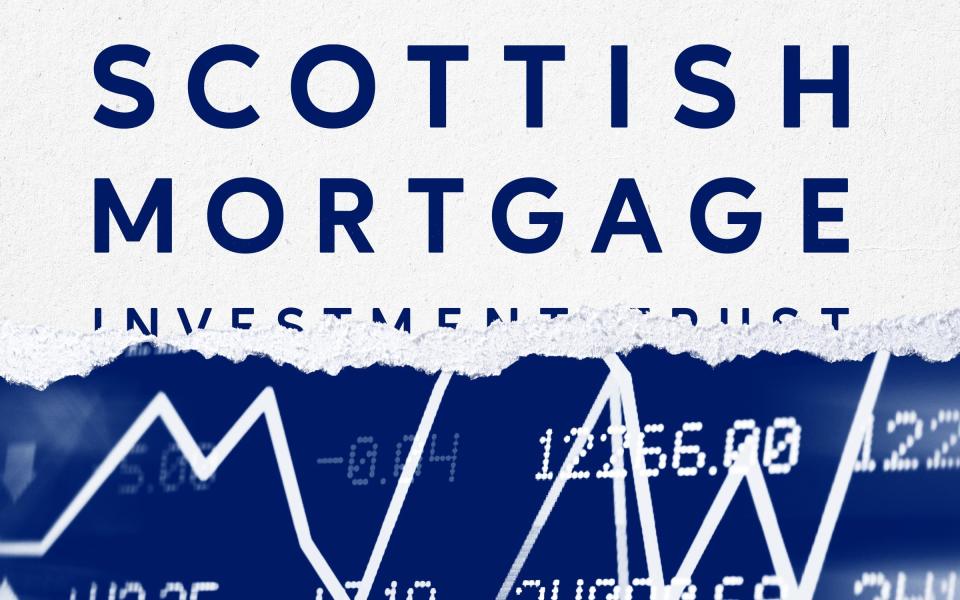What happened to Scottish Mortgage? Once Britain’s best loved fund, investors are nursing big losses

Scottish Mortgage investment trust has never been a fund for the faint-hearted.
The objective of the 115-year-old fund, which is worth around £10bn at today’s valuation, is to find and back high-growth companies that its managers believe have the greatest chance of changing the world.
It is a compelling investment case, and one that has served shareholders well in the past, with its total return 277pc over the past ten years according to the Association of Investment Companies. A £1,000 investment in 2013 would be worth around £3,760 today.
But the end of the era of cheap money has brought Scottish Mortgage’s share price crashing down.
Since its peak in November 2021, the price is down 50pc as soaring interest rates battered the fast-growing, largely technology-focused stocks that make up its portfolio.
Today, its shares are trading at a 10pc discount to the value of its underlying assets with influential brokers advising clients to sell their holdings.

Speaking to 150 investors at the Pan Pacific Hotel in London last week, manager Tom Slater said rising interest rates should not be such a significant challenge going forward and that the managers were therefore bullish on the outlook for their portfolio.
Analysts, however, are divided over whether the fund managers can turn it around. Whereas Jefferies maintains its “Buy” rating of Baillie Gifford’s flagship fund, rival Investec has had the trust on “Sell” since January 2023.
Last year, Questor, this newspaper’s daily stock-picking column, tipped the ailing fund on the back of its exposure to highly profitable private companies, long track record of impressive returns and tempting discount.
So, who’s right?
Telegraph Money sat down with Lawrence Burns, co-manager of Scottish Mortgage, to discuss the fund’s recent underperformance, its controversial private company listings and whether 2024 is the year growth investing comes back into favour.
What went wrong?
The past few years have been a harsh reminder that no one style of investing can win in all market conditions. Even so, compared to other similar trusts, Scottish Mortgage’s share price fall has been especially steep – and the fund managers admit that mistakes were made.
The first, Mr Lawrence said, is they were too slow to think through the implications of rising geopolitical tensions between the US and China. “With hindsight, we could have reacted more quickly to the increasing probabilities of that – and what the implications were for the portfolio,” he said.
Scottish Mortgage went against the grain by increasing its allocation to China at a time when other asset managers were slashing their exposure because of a regulatory crackdown.
Beijing proposed new regulations to curb the power of its internet platforms back in 2020 but it was not until 2022 that Scottish Mortgage reduced its stakes in Tencent and Alibaba.

Mr Burns said: “We’re in a more geopolitically volatile world than we’ve been in most people’s lifetimes, and that is going to affect investments. The lesson we take from that going forward is quite an obvious one of making sure that we think through increasingly the geopolitical implications of the investments that we’re making.”
As an example, Scottish Mortgage has invested in Northvolt, a Swedish battery company which currently makes up 3.2pc of the portfolio, hoping that the firm will become more strategically important as Europe looks to pivot away from the Chinese manufacturers currently dominating the industry.
The second mistake was underestimating the impact of deteriorating market conditions on companies’ growth, said Mr Burns. “I think we were probably too optimistic in terms of – as those lockdowns ended – the growth rates that those companies would be able to produce.”
Last year should have been different. But in 2023, as markets bounced back, defying gloomy market expectations, the investment trust was up just 13pc. By comparison, other growth-focused trusts such as Polar Capital Technology Trust rose almost 50pc.
Alan Brierley, an investment trust expert at Investec, said: “The numbers were ok. But they were well behind what other growth managers, like Polar Capital and Allianz, achieved.”
That is partly because Scottish Mortgage did not have exposure to some of last year’s top performers. While the trust has a stake in Nvidia, one of the best-performing stocks, it is not invested in Microsoft, Apple and Alphabet, responsible for much of the stock market gains in 2023 – and which allowed other investors to achieve better-than-expected returns.
But Mr Burns defended their decision to avoid some of the so-called Magnificent Seven.
“What we’re looking for is a small number of companies that can deliver exceptional outlier-like returns,” he said. “The difficulty you run into when you get into a multi-trillion dollar valuation is ‘can you make three, four or five times your money from here?’ For us, it’s not about ‘is this company a good company?’ It’s about ‘is it really going to make a difference for our shareholders over the long run?’”
Over leveraged and over exposed?
If you ask a bullish investor why you should buy Scottish Mortgage, and a bearish investor why you should sell, there is a good chance they will give you the same answer: the trust’s private listings.
Scottish Mortgage can invest up to 30pc of its money in unlisted holdings. This lets ordinary people gain exposure to companies they would otherwise struggle to access, such as ByteDance, the Chinese owner of TikTok.
More than half of its private company exposure is in 10 large firms. The jewel in its crown has been Elon Musk’s SpaceX, now reportedly worth $180bn (£142bn). Mr Burns said: “That’s the quintessential example of an asset that is targeting a huge industry, that is growing very well and has a really good track record in terms of profitability. It is in some ways a completely unique and prestigious asset.”

The rationale for investing in unlisted companies is that this allows investors to capture more of their growth before they go public. The average company now lists after 20 years, compared to four years in 2000.
But while some private companies have proven incredibly profitable, others have struggled to adapt to the challenging market conditions. One of Scottish Mortgage’s write-downs last year was Convoy, a freight start-up that plummeted from a valuation of $3.8bn to a shutdown in just 18 months due to a slump in shipping demand.
“Some investments will work, and some won’t,” said Mr Burns. “I feel far worse about the really successful private companies that we didn’t own than I do about the few that we had and that didn’t work out.”
Scottish Mortgage’s private company investments have been under increased scrutiny since former director Amar Bhidé left the board last year questioning the management of its unlisted holdings.
Several months later the trust released additional information on its top 10 private firms to reassure shareholders.
This revealed that over three years the average growth of these holdings was 164pc – or 58pc excluding one exceptional company.
Ewan Lovett-Turner, of broker Numis, said the disclosure showed that the portfolio “has the potential to deliver growth, even in a higher interest environment”.
Others, however, remain nervous about Scottish Mortgage’s level of exposure to private companies, which currently account for nearly a third of the value of its assets.
Analysts at JP Morgan warned last summer that the trust’s 30pc limit “could restrict its ability to buy back shares and to provide follow-on capital to private companies.”
But the managers have hit back at these concerns. “There were no new private company opportunities in 2023 that we were unable to make due to the 30pc limit,” said Mr Burns.
Scottish Mortgage, he continued, deployed £193m into private companies last year, including follow-on investments in software companies Databricks and Stripe and one new investment in tech platform Oddity.
Another source of worry for some analysts is the trust’s use of borrowing, often called “gearing”. Currently the trust is 12pc geared – slightly above its long-term average of 10pc and higher than the industry average of 7pc. “That is a high level of gearing for what is already a high risk strategy,” said Mr Brierley.
The advantage of gearing is it can enhance returns in rising markets. But conversely, it can magnify losses when markets are falling. Gearing in investment trusts has become more of a concern as interest rates have risen.
However, Mr Burns said: “The trust is in a strong position. It is 12pc geared, its average cost of debt is 2.7pc, and higher interest rates have little impact as we paid down the debt that was most sensitive to interest rate rises.”
Looking forwards, it has been reported that Northvolt is considering a stock market flotation this year and there has been much speculation that SpaceX could spin off its satellite business Starlink as well, although Mr Musk has poured cold water on these rumours.
In a note, Numis said these events would be significant for Scottish Mortgage as they would “provide a highly visible valuation point for investors” while also easing pressure on the 30pc limit in unlisted firms.
Whether 2024 could be the year the IPO market makes a comeback, there is no way of knowing. But a successful private company going public is now perhaps the trust’s best chance of improving investor confidence and kickstarting a recovery.

 Yahoo Finance
Yahoo Finance 